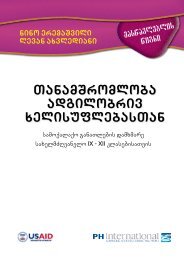The Geneva Protocol, by David Hunter Miller
The Geneva Protocol, by David Hunter Miller
The Geneva Protocol, by David Hunter Miller
Create successful ePaper yourself
Turn your PDF publications into a flip-book with our unique Google optimized e-Paper software.
CHAPTER XX. 139<br />
Justice, had been examined in London before the meeting of the Assembly. This examination had shown so<br />
clearly the difficulties which might arise in connection with disputes with neutral Powers arising out of British<br />
naval action in time of war, that the limitation of the acceptance <strong>by</strong> his Majesty's Government of the optional<br />
clause <strong>by</strong> the exclusion of disputes arising out of British belligerent action at sea was suggested. To achieve<br />
this it was proposed that His Majesty's Government {231} should make a reservation as to disputes arising out<br />
of action taken in conformity with the Covenant, or at the request, or with the approval, of the Council of the<br />
League.<br />
29. <strong>The</strong> suggestion was accepted <strong>by</strong> the British Delegation. As however, the question was clearly one which<br />
affected the Empire as a whole, the Dominion and Indian Delegations were especially consulted in regard to<br />
it. <strong>The</strong> position as it appeared to the British Delegation was fully explained to them, and it was understood<br />
that they would telegraph to their respective Governments, making clear the nature of the reservation<br />
proposed.<br />
30. <strong>The</strong> general discussion <strong>by</strong> the First Committee of the subject of the acceptance of the compulsory<br />
jurisdiction of the Permanent Court of International Justice took place at the third plenary meeting on the 11th<br />
September. <strong>The</strong> British Delegate reminded the Committee that the views of His Majesty's Government had<br />
already been explained in the Assembly in regard to the optional clause. <strong>The</strong> Prime Minister had then stated<br />
that the British Government wished to sign a clause of this kind, subject to its being clearly drafted. <strong>The</strong><br />
British Delegate proceeded to discuss the position of the British Empire supposing that it accepted the<br />
compulsory jurisdiction of the Court, and was then forced, in support of the Covenant, to go to war at sea. Sea<br />
warfare, he said, inevitably brought a belligerent into sharp conflict with the nationals of foreign Powers<br />
carrying on trade with the enemy State. <strong>The</strong> British Empire might therefore find itself forced to support before<br />
the International Court the legality of action taken at the request of the League itself. <strong>The</strong> British Delegation<br />
therefore asked the Committee to consider whether it would be possible, either <strong>by</strong> amendment of article 36,<br />
paragraph 2, of the Statute of the Court or <strong>by</strong> the admission of a reservation acceptable to other Members of<br />
the League, to exclude from the acceptance of that clause disputes which arose out of action taken, either in<br />
accordance with the Covenant, or at the request, or with the sanction, of the Council of the League.<br />
{232}<br />
31. <strong>The</strong> French Delegation were content with the idea of such a reservation, and both the Belgian and<br />
Brazilian Delegations stated that they had no objection to it. <strong>The</strong> delegate of Brazil, however, said he would<br />
prefer to proceed <strong>by</strong> way of a reservation rather than <strong>by</strong> any modification of the text. Though the<br />
representatives of the Netherlands and of Sweden were slightly more critical, it became apparent that no real<br />
objection would be raised to the British reservation.<br />
32. <strong>The</strong> Belgian Delegate suggested even going further still and excluding, when accepting the optional<br />
clause, the whole of sub-heading (b), which relates to questions of international law. <strong>The</strong> effect of this would<br />
be to exclude all questions of international law where that law has not yet been codified, as where it has been<br />
codified the dispute becomes one of the interpretation of a Treaty. This, the British Delegation thought, would<br />
be going too far. It would deprive the International Court of the power to build up a case law in the<br />
international field. It would, moreover, have gone further than the Delegation felt necessary, because it was<br />
only in the field of established international law, where there are two distinct schools of thought--the<br />
continental and the Anglo-Saxon--that the difficulties referred to <strong>by</strong> the British Delegate would arise.<br />
33. As regards the question of amendments to the Covenant, the French representative did not, during the<br />
general discussion in a plenary meeting of the First Committee, specify the nature of the amendments<br />
suggested <strong>by</strong> the French Delegation. He contented himself with drawing attention to three points. <strong>The</strong> first<br />
was the last sentence of article 13 of the Covenant, which provides that in the event of any failure to carry out<br />
an arbitration award, the Council shall propose what steps shall be taken to give effect thereto. This the French<br />
Delegation regarded as inadequate. <strong>The</strong> second was the provision of article 15 <strong>by</strong> which, if the Council cannot
















